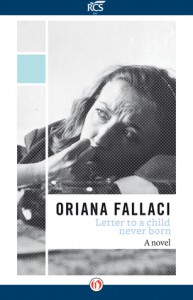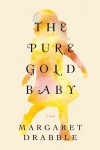Musings of a Bibliomaniac
Goodreads immigrant. Another victim of corporate tyranny. I blog at Musings of a Bibliomaniac along with my co-blogger Scarlet.
Review : Letter to a child never born by Oriana Fallaci

Once in a while, I stumble upon an unheard of book written by someone who expresses everything I have ever felt and says it as eloquently and without any reservations as I would hope to someday. And I realize once again why reading is so vital to my existence. Only literature helps me make my peace with all the ugliness in the world and infuses me with the strength to carry on with whatever futile everyday doings I busy myself with in the hope that someone somewhere is summarizing the human condition with deep empathy and sensitivity, for me to derive my solace from.
Orianna Fallaci makes no pretensions in this book. Doesn't sugar-coat her attempt at shaking the very rigid walls that make the citadel of patriarchy, doesn't shy away from tackling the entire spectrum of burning issues which if you proceed to discuss with friends and acquaintances even now in 2013, will earn you the raised eyebrows of some, urgently conducted hushed discussion of your morals as a 'woman' behind your back by others and vehement denouncement by the rest. And to think this brave war correspondent from Italy, who had removed the 'hijab' or 'chador' forced on her during an interview with Ayatollah Khomeini in Iran in addition to criticizing the imposed compulsion of wearing it, wrote this in 1975. (I am not going into the topic of her alleged Islamophobia)
A woman's right to her life over the life of her yet unborn child. Is there one?
And not just that. When do we say that life comes into being? At the moment of conception or in the ninth month and, in some cases, the seventh month when the foetus actually becomes viable?
How morally justifiable is it to ask a woman to behave, monitor her own mood changes, refrain from undertaking tasks which put a physical strain on her or treat her like an inanimate incubator designed to mold its existence around a foetus' needs? Is it okay to overlook the importance of the life of a full-fledged person of flesh and blood, with her own place in the world, taking only into consideration the hint of possibility of life that has taken roots inside of her? Given a choice, would an unborn child want to be born in a world like ours where a mother is unable to ensure her child's safety and slavery begins the moment we are liberated of our dark prison inside the mother's womb?
Oriana Fallaci writes with a poetic flair, fearlessly lending her voice to plenty of questions which nearly all of us (specially women) battle with in solitude over a lifetime but are often unable to articulate these ideas in front of an audience in fear of backlash by a predominantly conservative society. The central ideas are presented in the form of a young woman's internal monologue, in which she confronts her own fears, doubts, misgivings and suppressed anger while pretending to converse with her unborn child.
As I reached the end of the book I couldn't help but wonder if the irony of mostly men framing abortion laws in almost all nations of the world would have registered with the ones running our governments if they had a copy of this book? Probably not. After all, a writer like Fallaci is more likely to be labelled a 'radical feminist' and her views snubbed coldly with a patronizing shake of the head without further thought.
I haven't 5-starred this book merely because it deals with a strongly feminist humanist theme or because the prose is praise-worthy but also because it neatly presents a logical argument both in favor and in opposition of nearly every pronouncement of the pregnant woman. The unnamed protagonist's voice keeps shifting between the extremities of calm rationality and impatient anger, sometimes making irrefutably cogent statements in front of an imagined jury silently judging her thoughts and actions, and sometimes just lashing out in cold fury at the unfairness with which the world treats her.
She is as humane and prone to error as any one of us, which is why it is most important to acknowledge that our established notions of life, death and motherhood could be just as flawed.
 9
9
 5
5










